Peter MALONE
Saturday, 18 September 2021 19:25
Parasite Murders, The/ Shivers
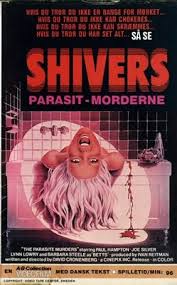
THE PARASITE MURDERS (SHIVERS)
Canada, 1974, 87 minutes, Colour.
Paul Hampton, Joe Silver, Lynn Lowry, Allan Migicovsky.
Directed by David Cronenberg.
Canadian writer-director David Cronenberg has received much critical acclaim and many condemnatory reviews. His films are similar in bizarre plot but Shivers has to be one of the most visually nauseating films ever. A plague of aphrodisiac parasites infects society with insane results. Rabid is much more acceptable visually and the 'plague in society' theme is formulated in a modernised Vampire plot - Vampiric Rabies and martial law in Montreal. It is thus a horror science fiction fable of scientists' pride, mutations and destruction of individual and social structures. Shivers focuses too much on its nausea for effectiveness. Rabid is more tasteful and better paced and is for horror addicts.
The Parasite Murders (Shivers) is an earlier work by David Cronenberg. He uses the styles and the methods of exploitive sex movies for a horror parable. The film is a Canadian production and has a Canadian setting. In this film a scientist sexologist sets in motion a contagion which is an aphrodisiac and venereal disease in one and has most disturbing effects on people as they spread it. It is an ironic and ugly satire on human behaviour and frenzy. The visual effects are shocking and the film is particularly nauseating to sit through - rather difficult for most audiences. However, within its genre, albeit limited, The Parasite Murders is trying to say something about contemporary society, frenzy. Rabid is a much more polished piece of film-making and is more acceptable for a wider horror audience.
Published in Movie Reviews
Published in
Movie Reviews
Tagged under
Saturday, 18 September 2021 19:25
Born to Run
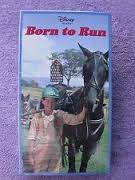
BORN TO RUN
US, 1977, 87 minutes, Colour.
Tom Farley, Robert Bettles, Andrew Mc Farlane, Mary Ward, Wyn Roberts, Kit Taylor, John Meillon, Alexander Archdale. Directed by Don Chaffey.
Ride a Wild Pony and Born to Run are two Walt Disney films produced in Australia. The director of each was Don Chaffey, who made The Fourth Wish and also made Pete's Dragon for Disney. Both films are about horses and ponies and appeal to younger audiences entertained by animal stories. They both star Robert Bettles, who also appeared in The Fourth Wish. Bettles is at times an abrasive young boy not the ordinary endearing Hollywood hero of Disney films. Ride a Wild Pony was filmed in Chiltern, Victoria and Born to Win around the Newcastle area. They both are period films and portray the Australian countryside and the period very attractively. Animal story, children, animals, striving to achieve are part of the ingredients which ensure success.
1. For whom was the film made? Children's audience, adults? An Australian audience? International? An Australian Disney film?
2. The importance of Australian locations, countryside, houses and estates, farms, towns, city, country horse-racing? The re-creation of the early 20th century?
3. The appeal of animal films, ponies, training, races? The title?
4. Where was audience identification - with Teddy? With the horses? The training, the presentation of the family, the race and the various heats and the difficulties?
5. How attractive a character was Matthew Boyd? The cranky old grandfather type, yet endearing? His relationship with Teddy, with Doone? His reputation in the town, borrowing money, mortgages? His sister looking down on him? His training of ponies and love of these? His discovery of Ira and his keeping of the ponies, his taking them over? His eye for a good pony? His training them, his antagonism towards the McGinnis? family? The build-up to the race, the third mortgage? The risks? His success at the end? Likeable but cantankerous?
6. Teddy and his relationship to his grandfather, seeing him race the Mc Ginnis at the beginning? Indication of his later success? At home, at work, liked in the town? His training of the ponies, especially after the impact of the death of his colt? His relationship with his brother? With Kathy? The sequences of training, his standing back at the race and yet his enjoyment, the opportunity for him to drive Dandy Boy and win? A likeable hero? A credible boy?
7. The contrast with Doone and his doing the work on the farm, trying to save the foal? His relationship with his grandfather and his antagonism, his relationship with his brother? His delight in seeing Kathy and their sequences together - with Teddy's ironic comments? The humour of them being in the water? The possibilities for Doone and the future? The lack of money? The build-up to the training of Dandy Boy and Doone's ability, his fight with the thugs and his having to give race to Teddy? His regaining Kathy after his period of jealousy and the hopelessness of their getting married?
8, The humour with Aunt Marian, her tough attitude towards her brother, the closing down of the estate? Her brother approaching her and the catastrophe with the greenhouse? Her arrival for the race, bets? The happy ending? Kathy as heroine - her love for Doone, her visit, the flirtation with Paul Sandford? The happy ending? An appropriate romantic sub-plot for the film?
9. Mc Ginnis and his son and their arrogance, the bet, the training, the suspicions that they had hired the thugs, the fair competition at the end?
10. Paul Sandford and his bet, his seeming pleasantness, flirtation with Kathy, the fact that he had hired the toughs, his foul methods and his exclusion from the race?
11. The excitement of the race and the heats, the country atmosphere, the finale and the achievement?
12. A satisfying story which retained the interest, pace? Winning and achievement, the presentation of people and their ordinary lives, within the early period of Australian history? Colourful, a rousing score? The right blend for family entertainment?
Published in Movie Reviews
Published in
Movie Reviews
Tagged under
Saturday, 18 September 2021 19:25
Rabid
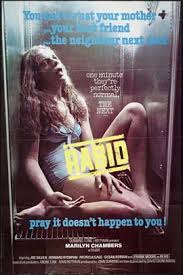
RABID
Canada, 1976, 91 minutes, Colour.
Marilyn Chambers, Frank Moore, Joe Silver.
Directed by David Cronenberg.
Canadian writer-director David Cronenberg has received much critical acclaim and many condemnatory reviews. His films are similar in bizarre plot but Shivers has to be one of the most visually nauseating films ever. A plague of aphrodisiac parasites infects society with insane results. Rabid is much more acceptable visually and the 'plague in society' theme is formulated in a modernised Vampire plot - Vampiric Rabies - and martial law in Montreal. It is thus a horror science fiction fable of scientists' pride, mutations and destruction of individual and social structures. Shivers focuses too much on its nausea for effectiveness. Rabid is more tasteful and better paced and is for horror addicts.
1. The significance and tone of the title, illness and madness, horror? Audience expectations ~ and fulfilment?
2. The value of horror films and the presentation of the ugly? The blend of reality and fantasy? Sick humour and the response to the shadow side, the dream side of human existence? The fantasies of the imagination? How necessary are horror films? This horror film?
3. Canadian production, atmosphere, perspective? The emphasis on the local scene, the universality of the story and its application?
4. How authentic the film? Plot, hypothesis, horror, behaviour? The presentation of the modern city, countryside? The presentation of people and their ordinary way of life and the intrusion of the parasites and the illness? The film's attention to details for the ordinary way of life? The effect of such intrusion and its credibility?
5. The importance of the special effects and their ugliness, the effect of the editing to highlight the horror? The organ for draining the blood, the gore, violence? Audience response to such blood and violence?
6. The introduction and the establishing of the mood, the situation, the horror? The personality of Rose, the accident? The consequences and the mystery? The details of bizarre behaviour and the continued mystery? The speculations about explanation?
7. The imagination of the writer-director in the story, the overtones of horror and science fiction, the Vampire traditions? The organ itself and its physical repulsiveness, the thirst for blood, the frenzy, blood lust, the contagion of the disease, its violent overtones, communication, destructiveness?
8. The contagion and its plague proportions? The way that it was spread, alarm? The disruption of the ordinary way of life in the city e.g. on the streets, in the trains, in modern department stores? The foulness and the juices going right through society? What happened to such society contaminated - could it be cleansed and renewed by such an illness or not?
9. The picture of the clinic, the patients, the various attacks? The doctor and people running amok? The clinic and the reversal of health and healing?
10. Rose as a modern type, her relationships, her infecting people, the boy~ friend, the hitch-hikers? The spreading of the disease through her? The exploitive tones in presenting her and the comment by the use of the overtones of exploitation movies?
11. The character of Hart and his concern for Rose, the hero of the film? Murray Cypher, his work, search, the attack?
12. The portrait of the police and their trying to cope? The importance of martial law being established? Health and illness as a cause for imposition of martial law? The carriers, the inoculations, the garbage? The transformation of society?
13. How important was the attention to detail in the drawing of characters, minor characters and their being established for their role in the spread of the disease, for horror and shock effects? The attention to the way of life e.g. in public transport, in the stores, in the streets?
14. The build-up to the climax, Hart and the confrontation with Rose? The vampiric frenzy at the end? The disposal of the refuse and the human refuse of the contagion?
15. The effect of an audience sitting through such a horror film? How many would want to appreciate this kind of film? The effect of its being a moral fable in horror and exploitive guise?
Published in Movie Reviews
Published in
Movie Reviews
Tagged under
Saturday, 18 September 2021 19:25
Rabbit Trap, The
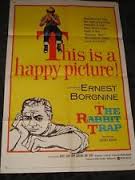
THE RABBIT TRAP
US, 1961, 76 minutes, Black and White.
Ernest Borgnine, David Brian, Bethel Leslie, Kevin Corcoran.
Directed by Philip Leacock.
The Rabbit Trap is a minor film, directed by Englishman Phillip Leacock who had made such films as The Kidnappers in the fifties. He then went to Hollywood where he has since directed many films and telemovies. The Rabbit Trap is a small drama about a family and work and the rat race. It is perceptive in its presentation of an ordinary family and its pressures. It capitalised also on the presence of Ernest Borgnine in a small scale role reminiscent of his role in Marty for which he won an Oscar in 1955. The Rabbit Trap is effective entertainment but also is quite telling in its message about modern city life and its pressures.
1. How entertaining a film, how serious a message film? The basic pessimism and optimism of the film?
2. The black and white photography, the American city and outdoor setting, the brevity of the film and its impact?
3. The significance of the title, its literal meaning and the rabbit trap at the beginning, the rabbit trap as a symbol for the family, the rabbit trap indicating the main issues of the film?
4. Audience response to the opening holiday atmosphere? The significance of the holiday for this family? Father and son working and enjoying things together? The wife and her relief at a holiday?
5. The film's contrasting this with life at the office? The boss and his busyness, the secretary trying to protect the family and their holiday? The ruthlessness and the overriding nature of work?
6. The hero and his being caught in the dilemma of work, holiday, family? What kind of man in himself, his background as an engineer, yet not well-educated? His love for his wife, son? His respect for his boss? Subservience to him? The dramatic impact of the arguments about the return? The significance of the return for all of them?
7. Comment on the detail of the family life and the hero presented in the interchanges with his wife, fighting her? His attitudes with the neighbours, at work, his talking to his boss, inability to express himself, his joy at the promotion, the momentum towards his resignation?
8. The picture of the wife? How convincing? Her support of her husband, her trying to make him see that work was not everything?
9. The picture of the son? His enjoyment of the holiday. his preoccupation with the rabbit and the rabbits caught in the trap, his attempts to go to free the rabbits, the impact of the bus ride? His return home? Going off together and finding the rabbit trap empty? This influence on his growing up?
10. The picture of the neighbours as giving an authentic background to this way of life? The issues and preoccupations of the neighbours?
11. The picture of the boss and his secretary? Their relationship? The boss and his glib talk about family life, his relentlessness in getting the work done? His buying a new and artificial rabbit trap? His attitude towards the hero, his not listening to him, his allowing him to resign, his comment about having the courage to resign?
12. How topical was this film? Its presentation of modern family life, life in the cities, preoccupation with work, careers, money? The dominance of work over the living of life? How real and convincing the message of the film?
Published in Movie Reviews
Published in
Movie Reviews
Tagged under
Saturday, 18 September 2021 19:25
Rain Man
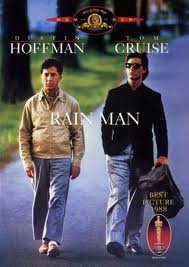
RAIN MAN
US, 1988, 126 minutes, Colour.
Dustin Hoffman, Tom Cruise, Valeria Golina, Bonnie Hunt.
Directed by Barry Levinson.
Rain Man was one of the hit films of 1988. Nominated for, and winner of many awards, it featured an award-winning performance by Dustin Hoffman, meticulous as an autistic savant, Raymond Babbett. Hoffman, an excellent actor and mimic, persuades us that he is Raymond Babbett and has this impaired communication personality. He contrasts excellently with an underrated performance by Tom Cruise as his bustling brother who takes him away from the institution for the wrong motives, has to change during a week of living with him and growing to understand and love him. Cruise is completely persuasive and Hoffman acts/ reacts excellently with him.
The film is a journey, a journey of love and redemption across the United States. Direction is by Barry Levinson, writer and director of such popular films as Diner, Tin Men, Young Sherlock Holmes, Good Morning Vietnam.
1. The impact of the film? Interest and enjoyment? Message? The acclaim?
2. The strength of the performances, qualities, characters, illustrating themes and the journey?
3. The film as an American journey: Los Angeles, Ohio, the Midwest, the West, Las Vegas? The roads, the towns, the homes, the landscapes, the desert? A piece of Americana?
4. Audience knowledge of and appreciation of autism: the diagnosis, the causes, symptoms? Charlie's anger and intolerance? Audiences sharing these attitudes with him? The bases for judgment about autism? Intelligence, sense data, memory. rituals and security, fears, non-involvement? Speaking style? Dustin Hofmann’s acting of autism offering insight?
5. The title, Charlie's story about the rain man protecting him, discovering that Raymond is the rain man, Raymond's memories, the song, the farewell, hurting the baby, protecting the baby?
6. Tom Cruise as Charlie: the cars, the deals on the phone, hustling, regulations and panic? Lennie and giving him ideas for deals? Susannah and her work for him? The pressure, the credibility of this hustler and his discovery of his brother for the rest of the film? To Palm Springs. Susannah wanting to talk, his offhand manner, hearing of his father's death, his non-reaction? The return, the funeral, going to his father's house, seeing the car, the memories, the story of his resentment of his father, his father's expectations and perfectionism, taking the car, driving with the friends, the father sending the police, leaving his son for two days in jail? Charlie's leaving, never corresponding with his father, never seeing him again? The story of the father and son as embodied in the father's letter and his will? The car and the roses? No money? The mystery of the beneficiary?
7. Charlie wanting to discover who the beneficiary was, visiting the institution, watching the patients, the Downs Syndrome people, going to the television, watching the quizzes? Raymond in the car with Susannah? His talking about the car? In a hurry for the television, the questions? Charlie's discovery, his reaction to his brother? Wanting to know why he had never been told? The secret? The doctor's reaction to Charlie?
8. Raymond and Dustin Hoffmann's performance: manner, speech, interior life? Initially at the car, in a hurry for the television, the importance of the rituals of television, His knowledge of the programmes, meals and the routine
Charlie interfering? his library and his growing anxiety? Going for a walk with Charlie, the beginning of a journey?
9. Charlie and his decision to take Raymond? Susannah and the car at the gate? Going off, Raymond's reaction, the car, the rules, insistence on time, television, the room and his rearranging it, the bed at the window? Being told to read the phone book (and the irony of his knowing the waitress's phone number the next day)? Alerted to the sounds, Charlie in bed, the television? The contrast between Susannah's reaction and Charlie's reaction? Charlie's intolerance and his not knowing how to treat his brother? Susannah's anger and her decision to leave? Charlie and his impatience, ridicule, anger? The going to the airport, taking the plane, Raymond's reaction about the crashes of the various companies, wanting to go by Qantas?
10. The decision to go by car, the crash on the highway, Raymond's reaction and statistics? Charlie following him slowly to the exit, going along the side roads? Going to the motel, Raymond and his under-wear, the repetition of various ideas? His wanting to drive, his memories of the past, taking the wheel? Charlie and his exasperation, taking Raymond to the doctor, calculations contrasting with his ignorance of prices? Going to the farm house and encountering the wife, his spiel about the TV ratings, Raymond watching the show with the children? meals, eating the maple syrup before the pan cakes, lights out?
11. The effect on Charlie, talking to his brother, the revelation of the photo of the two boys, a growing awareness of reality, Raymond's needs, a growing tenderness and care, less reprimand, understanding of the routines? His amazement as regards the number of toothpicks, the cards? The decision to go to Las Vegas: the suits and the haircut, the two brothers, playing at the table, the enormous success, Raymond distracted by the Wheel of Fortune - and losing the money? Raymond and the encounter with Trish, her reaction to him and dropping him, yet his wanting to learn to dance, the tenderness of Charlie teaching Raymond the steps - but not being able to hug him? Susannah's arrival, going on the date, the dancing in the elevator and the kiss?
12. Charlie and his continued phone calls, his concern about the cars, the deals, anxiety? The authorities at Las Vegas warning him off and telling him to go?
13. Going to Los Angeles, hopes, the change of heart with the doctor, Charlie and his decision to get custody of Raymond? Yet Raymond's outbursts, the touch, the heater going off? The importance of the discussion with the psychiatrist and the objective look at Raymond, autistic, Charlie's ability to look after him or not?
14. The change in Charlie, less hustle, a growing love and care, understanding the bond with the brother? The humour of the breakfast and his making a joke about maple syrup? Bud Abbott and Lou Costello and Raymond's repeating this but not understanding the joke? Charlie making, the decision, the
farewell to Raymond, the gift of the TV and Raymond holding it, Raymond going off without a companion? His future?
15. The finale and the audience sharing that moment with him? The effect of the experience, empathy, love? A blend of sentiment, realism and understanding?
Published in Movie Reviews
Published in
Movie Reviews
Tagged under
Saturday, 18 September 2021 19:25
Report Card Day

REPORT CARD DAY
Iran, 2000, 90 minutes, Colour.
Directed by Massud Karamati.
Report Card Day is a very entertaining film. While it focuses on an eight-year-old and his reaction to his failure in spelling on his report card and his deciding to jump off a building because he is an embarrassment to his family, the film also focuses on a man just out of prison bent on revenge against the business partner who defrauded him. The two characters intertwine in the building, escape from the building, encounter the police in the park but, with the boy telling the man about his failure, they become friends. During the day they have a number of adventures, meeting the man's wife, his buying a gun in the desert, the siege at his partner's house and the final confrontation with the gun. In the meantime, the boy's father, a middle-class doctor, is at his wit's end trying to find out what happened to the boy.
The boy himself is a natural actor, commanding the screen when he is there, powerful in his facial expressions and attitudes. The man matches him and they form an unlikely couple who keep audience interest and emotions very strong in trying to find out what will actually happen to each of them. Each saves the other.
1. A crowd-pleasing entertainment? Story of a little boy? Story of a victim? Their interactions? Ultimately saving each other?
2. The affluent background of Teheran, the school, the houses, the office blocks and offices? Cars and streets, parks? The contrast with the desert? The musical score?
3. The title, the focus on the report card, the schoolteacher and his reprimanding the boy, the boy taking his card home, leaving it for his parents with his suicide note, the card blowing under the sofa, the little girl finding it at the end - and the final freeze-frame as he realises that his parents have at last seen the card?
4. The character of the boy, Arad? His receiving his card, his going to the teacher, his being reprimanded for spelling, an embarrassment to his family? His being picked on by his older brother? His sister being spoilt? His going home, tidying his room, washing the dishes, leaving the note? His phone call to Hamid and telling him what he planned? Going to the building, using the woman to get inside, the guard getting him out again? The different attempts and his failure? The guard and his anger about the kids on the lift? The shot and his getting inside the building, going to that floor, finding out what happened? Going up onto the roof, seeing Amir wanting to jump off? His failure? The meeting of the two, his wanting to jump, the discussions with Amir, the gun? Amir threatening him and his realising he didn't want to die? The guard and his gun, their forcing him to change his clothes, the boy's idea? Going downstairs, Amir captured, his taking Arad as hostage? Their getting out of the building, the escape? In the park, the argument, the couple reporting them to the police? The interrogation by the policeman, his sympathy after hearing the story, putting on the handcuffs, Arad running off? Arad buying the insecticide, Amir stopping him drinking it? Their going off together, his telling him the wrong name? The appointment with Amir's wife and Arad learning his story? Going into the desert to buy the bullets, Arad persuading him to throw them away, Amir keeping two? The accident and Amir and Arad being injured by the car? Going to his partner's house, the wife and son, waiting, the man coming back, the confrontation, taking him with the gun, the partner's confession, his fear? Arad watching, persuading Amir not to kill him? His going back home? Amir listening through the communication system at Arad's being welcomed home? Arad and his parents, brother and sister, the welcome, Hamid and his phone calls, finally the report surfacing?
5. The character of Amir, seeing him on the roof, desperate, changing uniforms with the guard, taking Arad as hostage? His kindness in the park, with the insecticide, the accident? His becoming a father-figure to Arad? His wife and the deprivation of six years, wanting to see his son? Her not believing him? The truth of his story? The bullets in the desert, the siege, his confrontation of his partner? His not shooting him, taking Arad home? The promise of seeing him again with his own son?
6. The partner, being shot, only wounded, with the police? Well-to-do, prosperous? His return home, the confrontation, his fear, promise of recompense? His wife and son and their fear?
7. Arad's parents, professionals, high standards, their attitude towards their son, telling him he was an embarrassment? The effect on an eight-year-old? His brother and sister? Hamid and the computer games, friendship, phone calls, going with the father to the office? The mother returning and fainting on the news? The critique of professional parents?
8. The incidental characters: the policeman in the park and his kindliness, his own son's failure at exams? The couple concerned in the park? The guard and his suspicions? The gun and bullet-seller?
9. A satisfying entertainment at all levels?
Published in Movie Reviews
Published in
Movie Reviews
Tagged under
Saturday, 18 September 2021 19:25
Reservni Deli/ Spare Parts
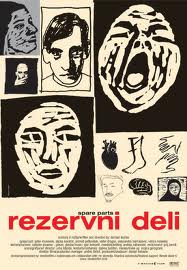
RESERVNI DELI (SPARE PARTS)
Slovenia, 2003, 87 minutes, Colour.
Peter Musevski, Aljosa Kovacic.
Directed by Damjan Kozole.
Spare Parts was written and directed by one of Slovenia's major directors, Damjian Kozole. He takes the situation in Slovenia at the beginning of the 21st century: flashbacks to the laying of the foundation stone by Tito of the nuclear power plant in Krsko; the importance of motorcycle speedway in Krsko and the celebrities and legends; the reality of the new democracy but also the exploitation of the refugees from Afghanistan and the Middle East as well as from the Balkan Peninsula.
The film is realistic - with some brutal touches as it shows the treatment of the refugees by the rather ordinary truckies who are eager to make money, exploit the refugees, not having any care or commitment for them and their fate. The film is sympathetic to the refugees and shows the brutality of their exploitation and what it means to them: a woman being sexually assaulted, a family put in the boot of a car and suffocating and their bodies thrown in the river, the moodiness of a driver who lets his passengers off on the freeway, the discussion about the refugees being exploited for their body parts in black-market deals in Continental Europe. The film takes us behind the headlines of the unfair and brutal treatment of the refugees as well as the plight of the refugees.
The actors are quite convincing in their roles. However, they are not entirely without heart and the impact of the film is showing their friendships, their falling-outs, their relationships, their own personal struggles and griefs alongside the callous treatment that they offer to the refugees.
1. The impact of the film? From Slovenia, about Slovenia, about abuses of refugees? The judgment on Slovenia, as communicated for the rest of the world?
2. The Slovenian settings, the town of Krsko, the nuclear power station and the film returning to it? The motorcycle stadium, the credits sequences, the events during the film, the finale with the new driver? The roads of the country, the forests and rivers, the borders, the overview on Italy and Trieste? The range of songs, the musical score?
3. The title, the explanation that the driver gave Rudi about the spare parts industry in Continental Europe, the refugees being drugged and their hearts, liver, kidneys and other organs taken and sold?
4. The situation of refugees in Continental Europe at the beginning of the 21st century? The countries and regimes from which they fled? Their hopes for Western Europe? The treks from their countries, the people from the Balkans, the 1000 Euros to travel simply through Slovenia from Croatia to Italy? The range of people, racial backgrounds, religious backgrounds? Their being handled like cattle and sent on their way to their fate? The irony of the men sometimes wishing them good luck?
5. The portrait of the various refugees: coming out of the river, going into the vans, into the oil tanker, into the boots of cars? The age range? The first group and the young Macedonian woman, her husband with a fever, the men wanting sexual favours, her eventually agreeing because of the antibiotics? The brutal treatment, Rudi and his gentleness, giving her the money, putting the coat over her? Her husband's reaction? Spitting at Rudi? Her grief, at the border, sitting, her husband calling for her? The television headlines and her having fallen and speculation about this (and Rudi sleeping and missing the news, later wondering where she was and thinking she was in a better place)? The old man who was caught and came back again? The family wanting to go early, squeezing into the boot of the car, the comment made that more Chinese could be fitted in, their knocking but the police being present, the suffocation, their bodies thrown in the river? The Muslim woman and her dead baby, being given some money, burying the baby at the border? The young people, the old? Others having to wait for the next day?
6. The focus on Ludvik, his career as a motorcyclist, his being a legend? Taking on Rudi? His cancer and Rudi discovering? His continually breaking wind? The pain of his cancer? His wife's suicide with her cancer pain? His callous attitudes, the discussions with Rudi, becoming a father figure? Reprimanding him and their fall-out? Wanting him to have sex with the Macedonian girl, demanding it? Asking about his relationship with the girlfriend? His getting older, sometimes mellowing? Accepting Rudi back? His death and people putting flowers on his grave? The moral judgment on him and his behaviour?
7. Rudi as young, inexperienced, learning from Ludvik? Watching the men with the Macedonian woman, being compassionate towards her? Continuing to drive, his attitudes hardening? Going to the party, meeting the girl sick in the bathroom, taking her home, the relationship? Her not taking his calls, following the speedway champion? Her pregnancy, being rejected by the rider, coming to Rudi? Together with him at the end? Rudi and his hardening of attitude, bad mood and leaving the people on the freeway? His explanation to Ludvik? The regrets about the fight, the reconciliation? The young man coming to Rudi at the motorcycle event?
8. The other drivers, talking about their families, their callous attitudes, the money, the pizzas, sexual favours?
9. The atmosphere of the town, the bars, friendships, the survival of the town with the nuclear plant, the speedway? The director's comment that this was Slovenia as it is?
Published in Movie Reviews
Published in
Movie Reviews
Tagged under
Saturday, 18 September 2021 19:25
Recruit, The
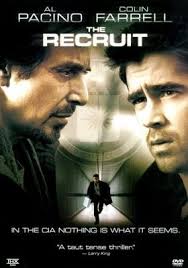
THE RECRUIT
US, 2003, 114 minutes, Colour.
Al Pacino, Colin Farrell, Bridget Moynihan, Gabriel Macht.
Directed by Roger Donaldson.
In recent years, Al Pacino has been making a lot of films. He has a strong screen persona, with an ability to come across as much larger than life (Devil's Advocate, On Any Sunday, Simone, Insomnia). In The Recruit, he is definitely larger than life, playing a veteran of years of covert activity, now on the brink of retirement, full of angers and resentments, but an overt patriot.
Colin Farrell, on the other hand, is a young man in search of a calling. The first part of the film shows Pacino playing cat and mouse with Farrell, trying to recruit him for secret service. Will he, won't he? What means of manipulating and manoeuvring will he use? Will Farrell succumb? Well, the title of the film does give it away. He does.
What follows are scenes of gruelling training, enough to make anyone in their right mind want to give up. However, Farrell's father may have been killed in some kind of operation in South America and he wants to know the truth. He perseveres and Pacino offers tantalising incentives of information.
The third act is more complex: the test. Farrell has to prove is worth as a secret agent, but undercover activity means living perpetually in puzzle and at risk. Who is telling the truth? Who is lying? Who is trying to kill whom? And why? And is it worth it? And that is how the film ends, with a high melodramatic confrontation, speeches about patriotism, violence. While this gives us action entertainment, I am not sure that it is a very effective campaign for real life recruiting to the CIA or other agencies.
The director is Roger Donaldson who made Thirteen Days and other action films.
1. A film about the CIA at beginning of the 21st century? Released during the time of the Iraq conflict? Its impact for Americans? For non-Americans?
2. The scenes in Boston, in Washington, at The Farm? Authentic atmosphere for the recruit himself, for Washington and Langley, for the CIA training? The musical score?
3. The title and its focus on James Clayton? The credits and the highlighting of the media on the disappearance of his father? The effect of his father on him? His work, Shell Oil, the different countries he grew up in, losing his father, his mother? His eagerness to find out more about his father? Walter Burke as a substitute father figure? His commitment to his CIA training and action because of Burke? The final disillusionment from Burke about his father? The contrary opinion and the close-up of the blank for 1990 with a star on the Roll of Honour in the CIA vestibule?
4. James Clayton, his age, waking up, rushing to the computer demonstration, his abilities with transferring programs to the big screen? The possibility of a big contract? His being watched by Walter Burke, serving in the bar, Burke's approach? The discussion? His listening, realising that he was being recruited, his initial negative reaction? The next day, the interview, coming out, finding that Burke was waiting for him? His commitment? His motivations?
5. The training, the group going in, his attraction towards Laila and Zach? The detail of the training, the lectures, the role of Walter Burke? In action, the rigorous exercise? The intelligence tests - and the comic collage of the questions asked? James's nonchalant answers? The further training, the tests? Going out to the bar to pick up a woman and his sympathy for Laila and his being tricked? The abduction, the torture, his finally giving in because of Laila? His thinking that he was a failure? His being sent away, his collapsing, drinking? The encounter with Burke, the explanation that he would be an operative outside the CIA?
6. The further mission, the information that Laila was Algerian background and a plant? His loyalty and surveillance of her, their relationship, his device of getting into her office as a delivery man, looking at the computer, with her at home, getting out of bed, the computer? Her shadowing him? Planting the devices for tracking and listening? The build-up to the confrontation, her taking the computer, having the material in the bottom of her flask? The chase, the confrontation, the crash? The explanations? His seeing her pass the material to Zach, the pursuit of Zach, the chase in the underground, shooting him? The emotional effect on James?
7. The final contact with Walter, urging him for the appointment, his explanation of Laila, the computer? The realisation that Walter had turned, the greed, his wanting the money? His device with the computer, bluffing that Langley was listening? The back-up squad, the shift of their sights from him to Walter? The finale about his search for his father, Walter's final hurting of him? The reaction to his death, a future with Bridget? With the CIA? In his blood?
8. Walter, the 27-year veteran, his talent for finding people with abilities? Stalking James, the interviews, the recruiting pitch? On The Farm, the lectures, not wanting to be his friend? Their discussions, discussions about his father? Setting the missions, the supervision, the surveillance? Commenting on people doing the exam and ousting the man cheating? His work at The Farm, his comments about lack of pay, lack of prestige, dangers? His giving James the mission, the explanation about Laila? James reporting back, his guiding him about the special program? The finale and the meeting, his pursuing James, believing that he was hurt by Langley? His outburst confession? The aim turned on him, his suicide?
9. Laila, her ambitions, her attitudes towards James, the lie detector test and the focus on eyes to know truth or falsity? The test in the bar? His revenge on the questions with the test? Together, his breaking because of her? His finding she was a spy? Her reality, CIA, doing the best, surveillance of James, the pursuit, the material in the flask? The finale?
10. Zach, rivalry with James, in the course, at the bar, getting the material from Leila, the pursuit in the underground, his death?
11. The personnel at The Farm, the CIA authorities? The role of the CIA, covert operations? Morality and amorality? Patriotism?
12. The rigours of the training, the moral perspective, altering people's attitudes to life and to one another? Trusting no-one? The sequence of torture and trying to break people?
13. The role of the CIA in the 21st century world? Espionage, counter-espionage?
Published in Movie Reviews
Published in
Movie Reviews
Tagged under
Saturday, 18 September 2021 19:25
Rules of Attraction, The
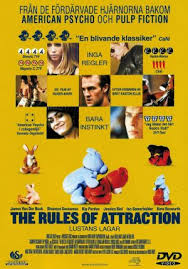
THE RULES OF ATTRACTION
US, 2002, 111 minutes, Colour.
James van der Beek, Shannyn Sossamon, Kip Pardue, Jessica Biel, Ian Somerhalder, Clifton Collins Jnr, Thomas Ian Nicholas, Swoozie Kurtz, Faye Dunaway, Kate Bosworth, Fred Savage, Eric Stoltz.
Directed by Roger Avary.
Brett Easton Ellis has built a reputation for novels that make readers squirm. He is a black and bleak satirist who takes on American society and shows its shadow, its violence and power, its lack of moral bases and the indulgence in sexuality and hedonism. His best known novel is American Psycho, filmed in the late 90s, showing us Patrick Bateman, the complete 80s yuppy who is conscienceless, narcissistic and destructive.
In The Rules of Attraction, we are introduced to his brother, Sean. Sean is a familiar campus type, intelligent, attractive, irresponsible yet a leader. He spends most of his time drug-dealing, moving around with his buddy entourage and in sexual activity. He is a lower rung Bateman who runs foul of his suppliers, lacking the class of his dapper brother.
Writer director, Roger Avary (Pulp Fiction, Killing Zoe) tries to give the visual equivalent of Ellis's novel. He roams the US campus, early 1990s, giving captions for the many parties that preoccupy the students. They are sex and pleasure focussed, but also have an apocalyptic tone, "The end of the world party..." He also tells the story of Laura, an ingenuous and romantic student who idolises Victor who does not know she exists. Then there is the story of Paul, the cynically flirtatious gay student who is a friend of Laura and infatuated with Sean. By starting at the end and, literally rewinding the film, we learn more than we probably want to know about these people and arrive back at the empty ending. Ellis and Avary want to show an empty, bleak world of self-centredness and indulgence that is almost nihilistic. They do.
1. The work of Brett Easton Ellis, his fiction, his observation of American society, grimly satiric look, black comedy, nihilistic perspective and moralising? His personal perspectives on Americans, hedonistic society?
2. The connection with American Psycho, the brother of Patrick Bateman, audience expectations of Ellis and the connection with the novel and Patrick Bateman?
3. The 1990 setting, the campus, college, corridors and classrooms, life on the campus, academic, in the rooms? The parties and socialising? Relationships, sexuality, drugs, hedonism?
4. The captions throughout the film referring to the particular parties, giving them titles, the emphasis on sexuality, on apocalyptic themes?
5. The musical score, the preceding decades?
6. The writer-director as involved with his characters, inviting the audience to be involved, or keeping them at a distance? Their own experiences, audiences sharing or not sharing these experiences and attitudes? Judging the characters? The effect of watching such a picture of hedonism, nihilism and potential self-destruction?
7. The structure of the film, the focus on Lauren, her memories, a virgin, with Paul, looking for Victor? Going to the room, the rape, the reverse sequences and their visual and psychological effect on the audience? The flashback to what led up to these episodes? Turning to them at the end knowing more about the characters and their attitudes?
8. Laura's story: age, background, character, her study, being a virgin, going to the parties, attracted to Victor, her decision about her virginity? The attraction to Sean, the friendship with Paul? Meeting the photographer at the party, passing out, the rape and his photographing it? Paul as a friend, his homosexuality? Her friendship with him, the attraction to Sean, finding him with Lara? The distance, yet the attraction? The build-up to going to the party?
9. Sean's story, at the party, bashed, the drugs, his being the centre of attraction, talking to the girl? His drug-dealing, his being a Bateman, popular on the campus, getting the drugs from Rupert, the visit to Rupert with his friends, Rupert's harangue, the confrontation, the threats? His meeting Lauren, attracted to her? His friends and the entourage? At the parties, drug supply? In himself, integrity or not, people finding him attractive, sexual partners, masturbation, Paul's attraction to him, sharing the drugs, Paul following him about, the phone calls, his detachment from Paul? The relationship with Lara? Meeting Kelly at the diner, her death, his reaction to her death? Attacked by Rupert, the bashing, finally going to the initial party, seeing Lauren - with a different attitude from what we first thought? With the young girl? His future?
10. Paul's story, seeing him at the party, the voice-over description of him, homosexuality, flirtatious? His relationship with Lauren, their being friends, seeing them together in the flashbacks? His taking drugs, inviting Sean up to the room, sharing the drugs, infatuated with him, masturbation? His return to his mother, his seeming propriety, good manners in front of his mother and her friend, his former boyfriend? At the table? Up in the room, the frenetic dance? Memories of the past? His observing situations, his disappointment with Sean? Accepting it? The contrast between his declarations of feelings, sex, drugs? And the voice-over about his feeling nothing? Finally seeing him at the party, going off with Lauren?
11. Victor's story, Lauren's praising him at the beginning, audience assuming that he was the boyfriend, glimpsing him only in the early part of the film, just one of the students? Yet enhanced by Lauren's thinking about him, talking about him? The visual techniques for the collage of his European trip, split-screen, time-lapse motion, the collage in the different countries, capturing the spirit of places like London and Rome? The sexual encounters, drug encounters, his hedonistic visit? His own comments about the experience? Lauren's visit, his coming to the door, the girl in the room, his not knowing her? Seeing him at the party with a different perspective from Lauren's point of view?
12. Sean and his friends, drugs, following him round, putting him on a pedestal? The encounters with Rupert and his friends, the violence, their backing out?
13. Lara, sharing the room with Lauren, attracted towards Sean, the sexual encounter with him - and his thinking of Lauren? Their being discovered by Lauren, her disappointment and disgust? The irony of her going into the next room, finding Kelly dead?
14. Kelly, quiet and mousy, at the diner, infatuated with Sean? Audiences not giving her much attention? Suddenly, with Lauren, finding her dead?
15. The other young girls, the one approached by Sean at the final party? Wanting a good time, study or not, parties, sex and drugs?
16. Rupert, his gang, different from the people on campus, his harangues, violence? Taking it out on Sean at the end?
17. Paul's mother, the fact that she was Faye Dunaway, glamour, good manners, indulgent towards her son? Her friend, her son, criticising him? Their having more and more drinks? The film intimating the double standards?
18. The professor, married, promiscuous, trying to seduce the girls, trying to get a hold over Lauren, exams and marks? Seeing him and his being a frequenter of the parties - with little future?
19. The final party, seeing everybody again, Sean, the girl, Victor ignoring her, Paul observing, her approach to the student, going upstairs, the rape, the rapist vomiting over her, the photography? Her finally going off with Paul?
20. The cumulative effect of observing this society? Identifying with it or rejecting it? The satiric interpretation? Black comedy?
Published in Movie Reviews
Published in
Movie Reviews
Tagged under
Saturday, 18 September 2021 19:25
Ring, The
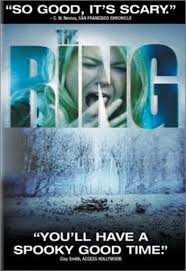
THE RING
US, 2002, 115 minutes, Colour.
Naomi Watts, Martin Henderson, David Dorfman, Brian Cox, Jane Alexander, Lindsay Frost, Amber Tamblyn, Rachel Bella, Daveagh Chase.
Directed by Gore Verbinski.
The original Japanese film, The Ring, was an eerie, spooky, thriller. So is this Americanised version.
The premiss is presented as an urban legend, that people who watch a particular video will receive a threatening phone call that they will die in seven days. Anyone in the audience who has a slight fear that this could happen will find the film frightening. Meanwhile, others can watch it more objectively, analysing how the scary parts work, especially as we, the audience, get to actually see that deadly video (which is an effective avant-garde/student arty combination of black and white grainy footage, closups of mysterious people and some enigmatic symbols).
It does not take long for video deaths to occur and for an intrepid reporter (an aunt of the victim) to sense a story. She tracks down the video and sees it - so she might as well spend her seven days trying to solve the puzzle, especially when her son watches it as well as her electronic expert friend and father of her child.
We do find out what the video is all about and the mystery of a malevolent little girl who can transmit images into people's imaginations. The reporter does not die after the seven days, but...
Naomi Watts is vigorous and persistent in her quest, with Martin Sanderson as the expert and Brian Cox turning up grimly as the little girl's father. If you want a scary movie, try The Ring.
1. The Japanese original? It success in Japan, round the world? The quality of horror in the Japanese film? Adapted to the United States? The popularity of the American version?
2. The reasons for the popularity: fear, terror, horror? The plausibility of the plot, the plausibility of such a video, a girl with such psychic powers? The technology and the video itself, the possibilities of technology carrying such power? The telephone ringing, the communication, the expectations of death? The mystery, a child who is evil?
3. The Seattle settings, the city, the countryside, the sea? The range of moods of the terrain, the seasons, the weather? Musical score?
4. The title and its evocation of the symbol of a ring, a circle, a phone call, the images of circles throughout the film, circles of light, coffee stains?
5. The prologue, the popularity of urban legends amongst young people, the explanation of the situation with the video and the ring, the girls, their friendship, talking? Becca and her bravado? Katie more reticent, telling the truth, the fear of death? The horror of her death and her face? Becca and her breakdown?
6. Rachel, Katie's aunt, going to the funeral, her work as a reporter? Her relationship with her sister, wanting to support her, hearing the story? Seeing the photos of Katie's face in death, hearing about the friends dying?
7. Rachel and her using her reporter instincts, tracking down the lodge and visiting it? The man playing the card tricks, the staff? Going to the same room, the image and reality of the tree outside, its colour, eeriness? Her decision to watch the video, the phone call, the voice of the girl, the threat of seven days? The mystery of her not appearing in photographs?
8. Her relationship with Noah, Aiden as their son, her separating from him? Their being friends, going to visit him, reliance on his skills? The discussions about the video, his analyses, helping? Looking at the video himself? The threat of the seven days? Rachel finding Aiden looking at the video, trying to stop him? The video itself, the audience's looking at it, the images, Anna, death, the style of black and white photography? A kind of student experimental film? Eerie?
9. Rachel's determination to investigate, tracking down the woman in the video, her research, newspapers, information about her, her death? Going to the sea, the visuals, the horse rampant on the ferry, Morgan and his caring for horses? Her visit to Morgan, the discussions about his wife, his reticence, the upstairs room? His killing himself? The identification of the woman, Anna's story, her daughter, her death?
10. Samara and her age, psychic powers, the power to communicate images, the effect on her mother, driving her mad, the mother trying to destroy her daughter, committing suicide? Yet living on in the video?
11. Morgan, the discussions with Rachel, her learning the truth, her horror at his death?
12. The well, falling down, trapped, the lodge? Getting out, Samara's body, discovering that she was there for seven days?
13. Rachel safe, the deadline passing, Aiden being safe? Nick's death?
14. Samara giving Rachel a mission to tell her story, letting Aiden survive to pass it on, new copies of the video for further victims?
15. The malevolence of Samara, her appearance, ghostliness, powers, instilling fear? Vindictive?
16. The experience for the audience, believable or not, what did the audience experience by the end and take from the theatre?
Published in Movie Reviews
Published in
Movie Reviews
Tagged under